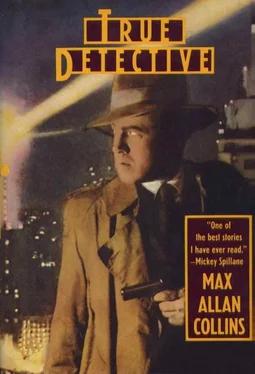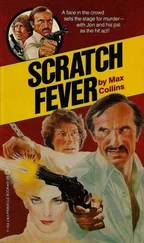“Mary Ann...”
“Just be honest with me. Don’t lie to me, Nathan. No secrets. No deceptions.”
“That’s good, coming from an actress.”
She sat up in bed; the blue robe hung open and I could see the start of the gentle curves of the cups of either breast. “Promise me,” she said. “No lies. And I’ll promise you the same.”
“Okay,” I said. “That’s fair.”
She grinned, and not impishly — not in any way contrived or calculated — a good, honest grin, and a beautiful one.
“Now,” she said, suddenly serious, slipping the robe off, “make love to me.”
I didn’t argue with her, even if this was her brother’s bed. But I did reach for my billfold, to get a Sheik, and she stopped me.
“Don’t use anything,” she said.
“That can lead to little Mary Anns and Nathans, you know.”
“I know. You can pull out if you want, but I want to feel you in me. And I want you to feel me...”
The intensity of the rain kept pace with us, and the reflection of the rain on her ghostly pale flesh as I arched over her, driving steadily but sweetly into her, was ever-shifting, creating streaky, elusive patterns on her, and her mouth was open in a smile, in her passion, and her eyes gazed at me with an adoration that I’d never seen in any woman’s eyes before; and when I withdrew from her, she had a momentary look of pain and then she grabbed that part of me in her hands so that I would spill into them, and she cupped my seed in her hands, then clasped her hands together and held the warm seed there and looked up at me with a closemouthed smile that I will take to my grave.
Finally, back to reality, she took some tissues from the pocket of the robe and, with droll reluctance, wiped her hands, putting the robe on, kissing me, touching my face, leaving me there, as the storm dissipated.
In the morning her father had grapefruit and coffee ready for us. He wore gray again — a different suit, a different gray tone in the tie, but gray again — perhaps that was because gray seemed the least conspicuous color for the ever-present gloves.
Mary Ann and I sat on one side of the nook, her father on the other; I stayed out of the breakfast conversation, for the most part, while father and daughter filled each other in on what they’d been up to lately. John Beame dutifully reported that he had indeed been listening to his daughter’s radio programs — he even took a morning break for “Just Plain Bill,” in his little office at the college; and he particularly liked an adaptation of “East Lynne” that he’d heard her in on “Mr. First-Nighter.”
That seemed to please Mary Ann, who was wearing this morning a feminine yellow-and-white print dress that I could not picture her wearing in Tower Town.
I took a quick look at the morning Democrat: hailstorm damage locally amounted to one hundred thousand dollars; one of the Scotsboro boys had been found guilty in that rape case; Roosevelt was asking Congress to approve of something he called the Tennessee Valley Authority.
“Can I give you a ride over to the college, sir?” I asked him, as the conversation between father and daughter seemed to have wound down.
“I usually walk,” he smiled, “but I’m willing to be a loafer this once.”
“Hope you don’t mind the rumble seat,” I said.
“I’ve put up with worse indignities,” he allowed.
“That must mean I’m invited along,” Mary Ann said.
“Sure,” I said. “For right now.”
She went mock-snooty. “Well, I like that ,” she said, getting out of the nook, going after her purse. Her father and I let her lead us out to the car, where the drive and lawn were strewn with melting hailstones; it was cloudy and a little cold. Somebody somewhere in town was burning garbage: the smell hung in the dank air like rotten fruit. Soon we were going down Harrison, cutting left on Seventh Street, and heading up the steep hill of Brady.
At the crest of Brady, across from a mortuary, was Palmer College, a collection of long rambling brown-brick buildings crowded together, taking up two square blocks. In front of what seemed to be the central building was a round deco clock on a skinny pole and a neon sign that said:
RADIO STATION
W
O
C
VISITORS WELCOME
and, beneath that, CAFETERIA, inside a neon pointing arrow. From atop adjacent buildings, twin black antenna towers rose like derricks.
I found a place on the street to park and followed Beame and his daughter into the building the neon hung from. There were students in their twenties all about, mostly male, but a few female. Inside, the place looked like pretty much any college, with one strange exception: epigrams were painted in black on the cream-color plaster walls, just about everywhere you looked: over doors, on the ceiling, on the wall going up the stairs, everywhere. Their wisdom seemed a bit obscure to me, at best: “Use Your Friends/By Being of Use to Them”; “Early to Bed, Early to Rise/Work Like Hell and Advertise”; “The More You Tell/The Quicker You Sell.” Was this a medical school for bonesetters, or a training school for Burma Shave salesmen? Mary Ann must’ve caught me making a face, and shook her head, letting me know this was not a subject to get into with her father.
We went up an elevator to the top floor of the school, the doors opening onto the reception room of the radio station, which was even stranger than the motto-strewn floors below: it resembled, more than anything, a den in a hunting lodge. A heavy chunk of wood with wavy letters spelling reception room carved out of it hung by chains from a ceiling that was crossed by several varnished tree trunks; the rustic wood-and-brick room was wall to wall with photos of celebrities, both local and national, in misshapen roughhewn frames. Visitors were apparently expected to sit on benches made of varnished tree limbs and branches; amid this rustic nonsense was an electric sign with lit-up red letters that demanded silence and reminded you, vaguely, that this was the twentieth century.
This time Beame noticed me smirking, I guess, because he seemed a little embarrassed, as he gestured to the area and said, “B.J. does have his eccentricities.” He meant B. J. Palmer, of course, head of the school and the station, and judging from the sotto voce Beame used, which wasn’t just because of the silence sign, B.J.’s being eccentric wasn’t a thought you expressed openly, at least not loudly.
There was no receptionist, but we hadn’t been there long when, through a rectangular window that seemed at first to be just another (if oversize) photo on the wall, a face peered, belonging to a handsome collegiate-type with crew cut and glasses, wearing a brown suit and green tie.
He came into the reception room, moving with an athlete’s assurance, and Mary Ann smiled at him and he smiled shyly back at her and then the smile turned almost brash as he held his hand out to me, saying, “I understand you’re from Chicago.”
“That’s right,” I said.
“I tried to get work there,” he said. “They said I should try a station in the sticks.” He grinned and nodded up at the wood overhead. “So I took ’em at their word.”
Beame put a hand on the kid’s shoulder and said, “Nate Heller, this young man is Dutch Reagan. He’s our top sportscaster. In fact we’re losing him to our sister station WHO in Des Moines, in a few weeks.”
“Glad to meet you, Dutch,” I said, and we shook hands: Yes, he was an athlete all right. “Hope we’re not interrupting you.”
“I don’t go on the air for another fifteen minutes yet,” he said.
Beame introduced Reagan to Mary Ann, who was obviously impressed by the handsome kid.
Читать дальше












